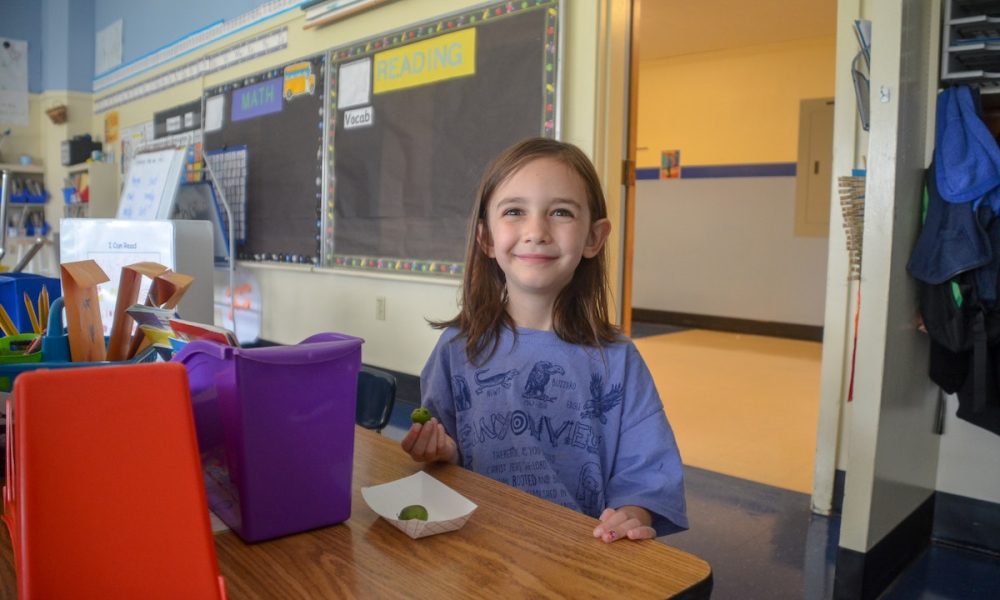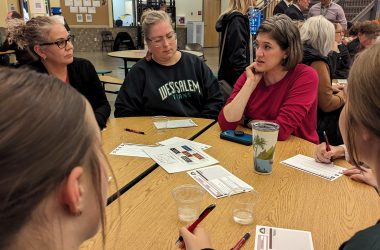 Bella Blessing smiles while eating a kiwi berry during her first grade class at Hoover Elementary School. (Rachel Alexander/Salem Reporter)
Bella Blessing smiles while eating a kiwi berry during her first grade class at Hoover Elementary School. (Rachel Alexander/Salem Reporter)
Most students in Veronica Sedlacek’s first grade class had never heard of a kiwi berry.
Before serving the grape-sized fruit to them as a snack last week, Sedlacek gave them a brief introduction.
“It’s called a kiwi berry because it’s a kiwi but it looks like a—”
“Berry!” the students shouted. Their teacher explained that the softer the berry was, the sweeter it would taste.
[ Help build Salem Reporter and local news – SUBSCRIBE ]
The fresh snack is a near-daily occurrence at Hoover Elementary School, where about 90% of students live in families with incomes below the federal poverty line.
It’s one of six Salem-Keizer elementary schools enrolled in the Fresh Fruits and Vegetables program, a federally-funded effort to get more produce in the hands of kids who might not get it at home.
Students at Highland, Richmond, Four Corners, Auburn and Hayesville also benefit from the program, which Salem-Keizer has participated in for at least five years.
Teachers get a new fresh fruit or vegetable from Tuesday to Friday, along with a fact sheet about the selection. They can choose when to serve it to their students: many opt for after recess or PE to ease the transition back to class.
 Veronica Sedlacek, a first grade teacher at Hoover Elementary School, gives a kiwi berry to a student during a morning snack break. (Rachel Alexander/Salem Reporter)
Veronica Sedlacek, a first grade teacher at Hoover Elementary School, gives a kiwi berry to a student during a morning snack break. (Rachel Alexander/Salem Reporter)
Nancy Satalich, the assistant director of Salem-Keizer’s food and nutrition program, coordinates the program with Sodexo dietician Terri Lloyd-Jones, who often selects the produce to be served. It’s ordered specifically for the six participating schools.
Satalich comes from a family of farmers and loves seeing new fruits and vegetables she doesn’t recognize in the grocery store.
“We can’t pass a produce stand without stopping,” she said.
She aims to have fresh selections from Oregon and Washington, though it’s “not always possible in the dead of winter.”
Recent selections included pluots, fresh pineapple chunks, zucchini sticks, jicama, parsnips and mini sweet peppers.
“I’ve seen some really awesome stuff go out,” Satalich said. “We got some beautiful strawberries in last year.”
District employees aim to introduce new fruits and vegetables they think kids will like.
“Figs are always fun because the kids don’t like the looks of them, but that’s what it’s all about: experiencing new things,” she said.
Kiwi berries are a relative of the more familiar kiwi fruit, native to east Asia. They grow on vines and don’t produce the hairy, tough skin of their larger cousins, meaning they can be eaten like a berry.
In recent years, American farmers have started growing the fruit. The elementary school snack came from a berry packer in McMinnville.
And in Hoover classes, the selection was popular.
“They were a little apprehensive at first,” said first grade teacher Alvaro Centeno. But nearly all of his students were fans.
Centeno is a bilingual teacher originally from El Salvador, and many of his students have family in Mexico. He enjoys highlighting foods grown in Mexico or Central America for his students, connecting the produce back to a Mexican state where someone has relatives.
He often serves the food in the afternoon, when students are hungry enough that “you can pretty much feed them the things they won’t otherwise try.”
His snack time includes a discussion on nutrition, explaining how fruits and vegetables benefit the body and what a plate should look like for a healthy meal.
 Veronica Sedlacek, a first grade teacher at Hoover Elementary School, passes out kiwi berries for her students. (Rachel Alexander/Salem Reporter)
Veronica Sedlacek, a first grade teacher at Hoover Elementary School, passes out kiwi berries for her students. (Rachel Alexander/Salem Reporter)
In Sedlacek’s class, students were clamoring for the berries. That’s not unusual, she said. Fruits usually go over well, while vegetables are more hit and miss.
“Some of the vegetables, I think they already think that they don’t like it,” she said.
She encourages reluctant eaters by telling them to just try one berry or one bite – they don’t have to keep eating if they don’t like it.
One initially skeptical student bit into a kiwi berry after Sedlacek’s prompting, then asked for more.
“I could eat these all day,” said student Avory Thomas.
“I wish I could get more. It’s so good,” said Bella Blessing, his tablemate.
Reporter Rachel Alexander: [email protected] or 503-575-1241.

Rachel Alexander is Salem Reporter’s managing editor. She joined Salem Reporter when it was founded in 2018 and covers city news, education, nonprofits and a little bit of everything else. She’s been a journalist in Oregon and Washington for a decade. Outside of work, she’s a skater and board member with Salem’s Cherry City Roller Derby and can often be found with her nose buried in a book.









